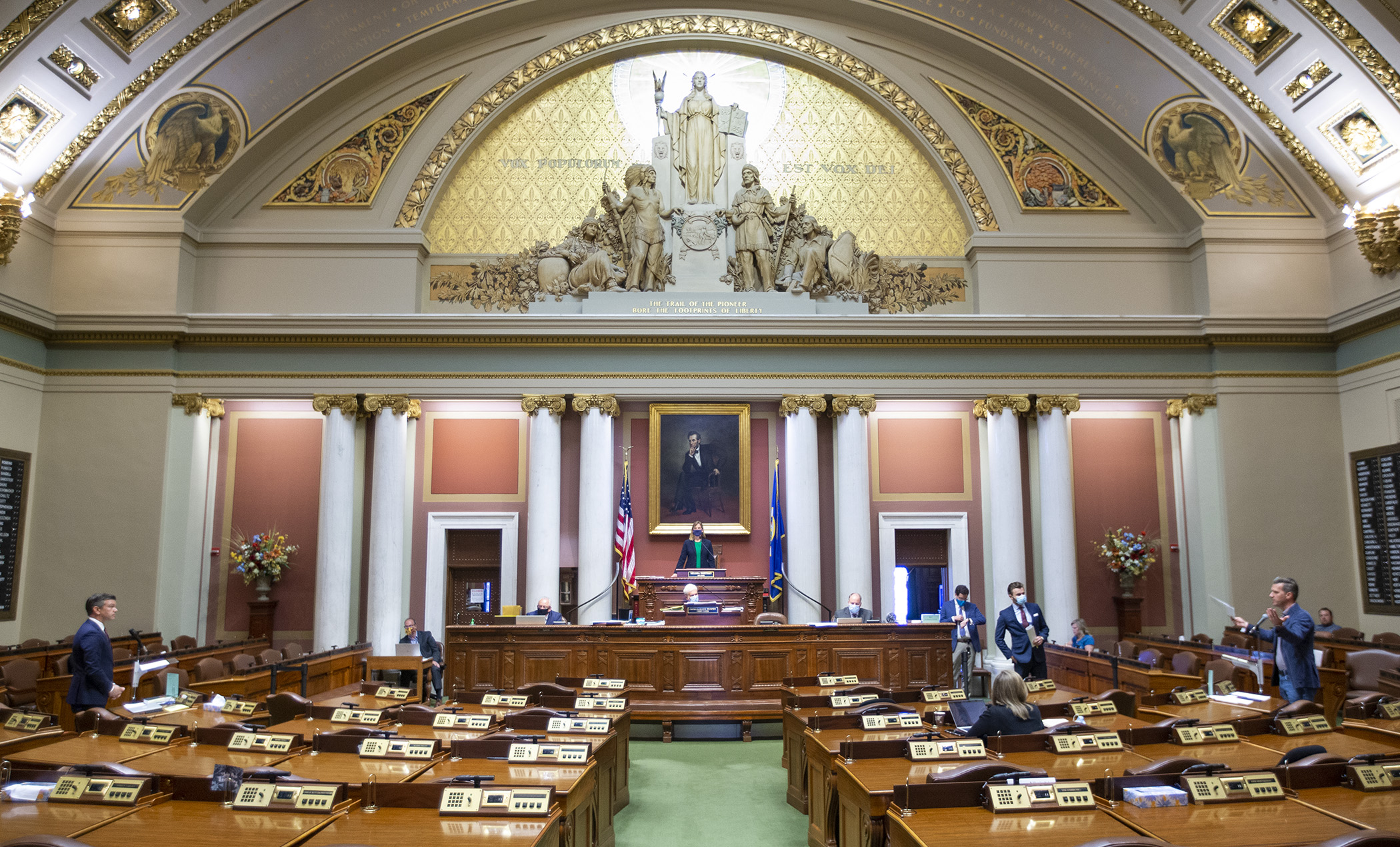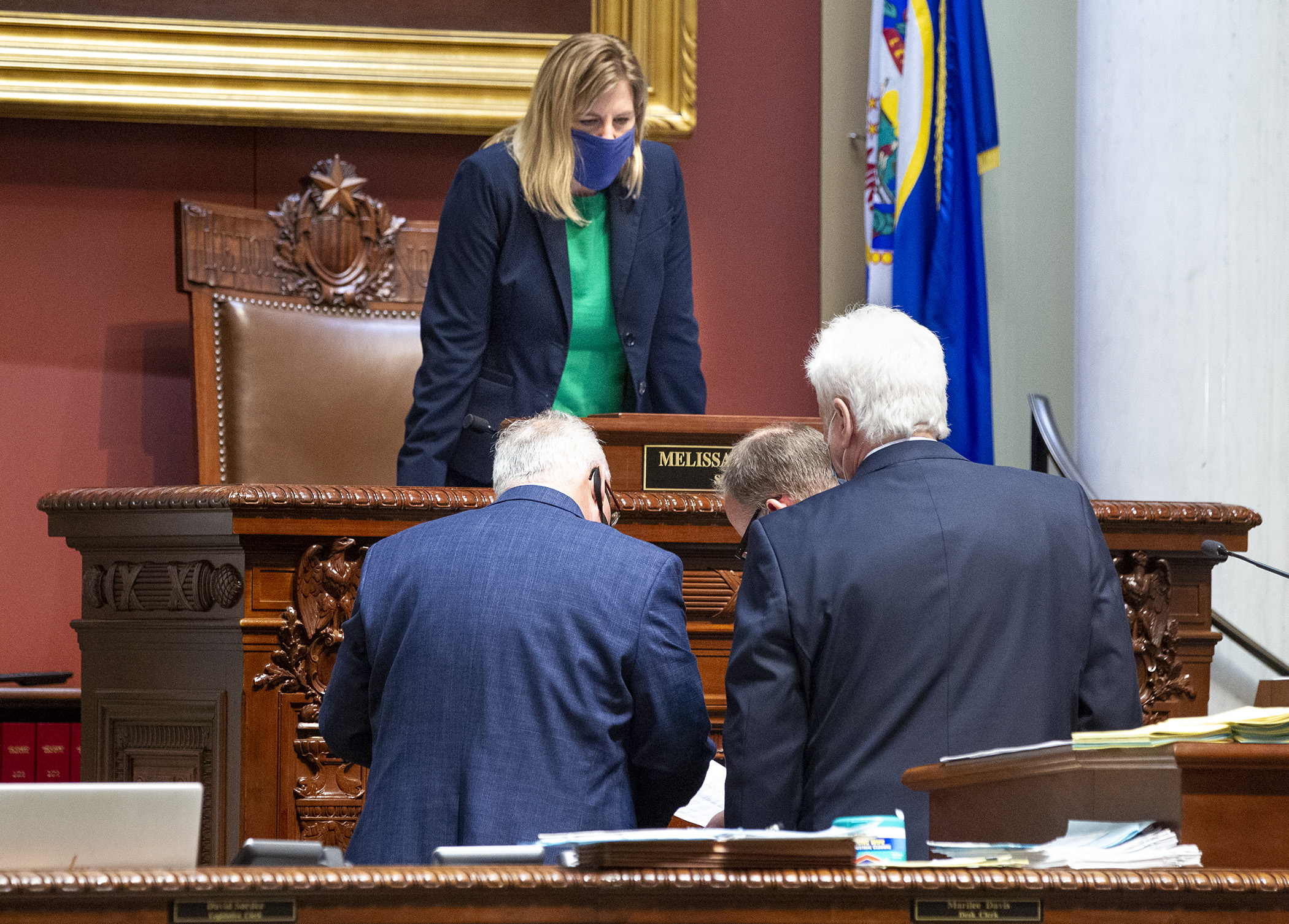Major bills taking final shape in House as special session — potentially? — nears its end

The COVID-19 pandemic has largely been pushed to the back burner, replaced by issues that have been simmering for years, if not generations, but have again boiled over.
As the regular legislative session wound down and it became apparent lots of business would be unfinished, it was widely assumed the Legislature would be back for a mid-June special session when Gov. Tim Walz extended his peacetime emergency order related to coronavirus.
What nobody could have anticipated was an action caught on video that sparked civil unrest locally, nationally and around the world.
It is widely accepted that Minnesota has some of the largest racial and economic disparities in the country. Some of those issues have risen to the forefront after the Memorial Day death of George Floyd, a black man, under the knee of a white former Minneapolis police officer.
A peaceful remembrance of Floyd remains at the corner where the 46 year old lost his life. However, not too far away, parts of Minneapolis were damaged or destroyed by rioters and looters. The unrest also expanded to St. Paul and other areas in the Twin Cities.
Local businesses — many minority owned — were destroyed, and while the flames and physical fear have been gone for nearly three weeks, tension remains. That is especially true for members of the People of Color and Indigenous Caucus, a group of 14 House members and five senators, who have responded with a package of nearly two-dozen proposals for reform.
 House Speaker Melissa Hortman looks on as the Chief Clerk Pat Murphy, Legislative Clerk David Surdez, left, and First Assistant Chief Clerk Tim Johnson check a roll-call vote total during the June 17 floor session June 17. Photo by Paul Battaglia
House Speaker Melissa Hortman looks on as the Chief Clerk Pat Murphy, Legislative Clerk David Surdez, left, and First Assistant Chief Clerk Tim Johnson check a roll-call vote total during the June 17 floor session June 17. Photo by Paul BattagliaIn a June 9 statement, caucus members said, “It is time to break down structural racism and fundamentally reshape how law enforcement interacts with our communities to ensure there can be accountability and justice. We can’t wait any longer.”
One of the results in the House is a trio of public safety bills amended and approved Wednesday by the House Ways and Means Committee on party-line, or nearly party-line, votes.
Time is of the essence if an agreement is to be reached because Senate leadership has said they'll be done with the special session by Friday. House DFL leaders say members should stick around to craft meaningful proposals. Of course, Walz has the power to call members back right away.
“For generations, Black Minnesotans have been expected to wait patiently for equity and justice. Real criminal justice reforms and accountability for police violence is just one example of needing to wait entirely too long,” Rep. Rena Moran (DFL-St. Paul) said in a statement. “We aren’t prepared to accept arbitrary deadlines or lines in the sand from Republicans when it comes to this issue. We have the opportunity to do truly transformational work, and we’re prepared to do whatever it takes to deliver fairness, justice, and safety in our communities.”
Bills have moved quickly through myriad House divisions and communities — including a seven-hour public safety hearing Saturday. On Tuesday, some members noted their fatigue and, although hearings were done remotely, viewers could sense the tension and frustration with both the underlying reasons for the bills and the process.
The House’s three main public safety and law enforcement accountability bills, sponsored by Rep. Carlos Mariani (DFL-St. Paul) and amended onto Senate files Wednesday to include the House language for each, are:
- The “Reclaiming Community Oversight Act,” SSHF93/SSSF104*, which includes provisions that would require peace officers to intercede when another officer is using excessive force and report the incident to supervisors; establish law enforcement citizen oversight councils and peace officer residency requirements; ban chokeholds and prohibit “warrior-style training” for peace officers;
- The “Reimagining Public Safety Act,” SSHF92/SSSF1*, which is built around increased training and transparency for police officers and includes restoring voting rights to convicted felons immediately upon their release from prison; and
- The Reforming Accountability Act, SSHF1/SSSF3*, which is designed to clarify when police can use deadly force and the legal oversight of those encounters, along with a provision that would eliminate the need for cash bail for most misdemeanor offenses.
[MORE: View a spreadsheet of the three proposals]
But none of those measures will become law without the Senate’s help, and significant differences remain between the changes sought by DFLers in the House and legislation that’s made its way through the Republican-controlled Senate.
Senators met late into the evening Tuesday, passing several bills related to law enforcement accountability and reform. They include:
- SSSF1 (Limmer) – which includes a requirement that peace officers take mental illness and autism crisis intervention training;
- SSSF3 (Ingebrigtsen) – which would require police to provide information, when requested by the Federal Bureau of Investigation, about each use of force incident resulting in bodily harm or death;
- SSSF5 (Ingebrigtsen) – which would limit the admissibility of statements made during public safety peer support activity and critical incident stress management services;
- SSSF49 (Ingebrigtsen) – which would expand the access law enforcement agencies have to information about potential employees during the hiring process; and
- SSSF104 (Limmer) – which would require law enforcement agencies to update their use-of-force policies, require peace officers to intervene when observing excessive use of force and report those instances, and ban neck restraints and chokeholds that restrict an airway.
Senate Democrats don’t believe those measures are enough to achieve significant change. Senate Minority Leader Susan Kent (DFL-Woodbury) said her colleagues hadn’t done enough to address racial disparities and injustices in the criminal justice system.
“The legislation passed today includes no substantive changes to our criminal justice or policing system,” Kent said in a statement. “It is simply not enough to pass the very bare minimum and then pat ourselves on the back. We need real, meaningful change in order to hold systems accountable and keep communities safe.”
PROMISE Act
Also approved Wednesday by the House Ways and Means Committee was SSHF132, as amended.
Sponsored by Rep. Mohamud Noor (DFL-Mpls), the bill includes provisions contained in six other pieces of legislation – and several clone bills – focused on rebuilding areas damaged by civil unrest and amounting to about $300 million in appropriations over the 2020-21 biennium.
“Where we go from here really defines who we are,” Noor said. “When there’s no hope, anger and despair move in. We must not ignore the underlying issues.”
The combined legislation has been collectively referred to as “The PROMISE Act” – standing for “Providing Resources, Opportunity and Maximizing Investments in Striving Entrepreneurs.”
It includes:
- The original SSHF132 (Noor), which would create a special master panel to make awards to compensate for damages suffered by certain persons resulting from the civil unrest during May and June of 2020;
- SSHF6 (Davnie), which would appropriate $167.57 million from the General Fund to establish and fund a “civil unrest immediate relief program,” focused on preserving existing businesses and encouraging economic growth;
- SSHF85 (Lee), which would establish the Metropolitan Area Redevelopment Corporation, a nine-member board that would oversee planning and award millions of dollars in grants to the impacted areas;
- SSHF84 (Dehn), which would direct the Department of Commerce to help impacted business owners deal with property, casualty or liability insurance claims;
- SSHF82 (Hassan), which would limit rent for certain commercial and residential properties to no more than the average rent charged in the first three months of this year or, if rent is paid annually, the last annual rent payment prior to March 1, 2020;
- SSHF80 (Gomez), which would allow Minneapolis, St. Paul and surrounding cities affected by civil unrest to acquire property by eminent domain, to sell for redevelopment that would benefit the neighborhood; and
- SSHF79 (Gomez), which would provide certain sales tax exemptions and property tax relief for properties and businesses damaged or destroyed during the unrest.
COVID-19
The committee also briefly discussed the CARES Act and a second batch of federal funding it provides earmarked for the cities and counties of Minnesota. It’s up to the Legislature and governor to determine who gets how much.
The DFL and Republican caucuses of the House and Senate forged a compromise on how to divide the $841 million in federal funds, a formula that appears in SSHF128, sponsored by Rep. Paul Marquart (DFL-Dilworth), and SSSF47, sponsored by Sen. Julie Rosen (R-Vernon Center).
The Senate version was passed, 62-4, on Tuesday, and the House Ways and Means Committee plans to act on the bill Thursday morning. It was revealed during a contentious House floor session Wednesday that it would contain an amendment that features items from the governor’s supplemental budget.
Saying the bill had support from leaders of all four caucuses, Republicans said the change could put money intended for cities and counties in jeopardy.
“This is politics at its worst,” said Rep. Anne Neu (R-North Branch).
House Majority Leader Ryan Winkler (DFL-Golden Valley) noted the committee would have a chance to talk about things like child care rates, transit safety, and prevention of suicide and homelessness for veterans. “By going through the committee and having a hearing and coming back to the floor is the best way for us to weigh in as the Minnesota House rather than deferring to a supposed agreement among leaders or a decision by the Minnesota Senate that this is the best thing to do.”
— House Public Information Services’ Mike Cook, Jon Mohr, Victoria Cooney and Rob Hubbard contributed to this story
Related Articles
Search Session Daily
Advanced Search OptionsPriority Dailies
Ways and Means Committee OKs proposed $512 million supplemental budget on party-line vote
By Mike Cook Meeting more needs or fiscal irresponsibility is one way to sum up the differences among the two parties on a supplemental spending package a year after a $72 billion state budg...
Meeting more needs or fiscal irresponsibility is one way to sum up the differences among the two parties on a supplemental spending package a year after a $72 billion state budg...
Minnesota’s projected budget surplus balloons to $3.7 billion, but fiscal pressure still looms
By Rob Hubbard Just as Minnesota has experienced a warmer winter than usual, so has the state’s budget outlook warmed over the past few months.
On Thursday, Minnesota Management and Budget...
Just as Minnesota has experienced a warmer winter than usual, so has the state’s budget outlook warmed over the past few months.
On Thursday, Minnesota Management and Budget...